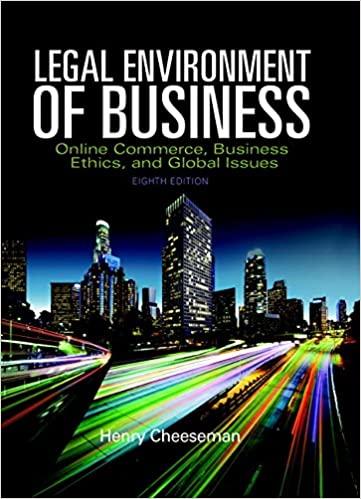Question
Brief Fact Summary. Prior to passage of the Civil Rights Act of 1964 (the Act), the Appellant, Heart Atlanta Motel, Inc. (Appellant) operated a motel
Brief Fact Summary.Prior to passage of the Civil Rights Act of 1964 (the Act), the Appellant, Heart Atlanta Motel, Inc. (Appellant) operated a motel which refused accommodations to blacks. Appellant intended to continue this behavior to challenge Congress' authority to pass the Act.
Synopsis of Rule of Law.Congress may regulate the ability of commercial institutions to deny service on the basis of race under its power to regulate interstate commerce.
Facts.Heart of Atlanta Motel had 216 rooms available to transient guests and had historically rented rooms only to white guests. Appellant solicits business from outside the State of Georgia through advertising in national travel magazines and other media. Approximately 70% of its guests are from outside the state. Appellant contends that Congress has overreached its authority under the Commerce Clause in enacting the Act.Issue.May Congress prohibit racial discrimination in hotel lodging under the Commerce Clause?
Held.Yes. Appeals court ruling affirmed.
Congress heard testimony from many sources describing the hardships blacks face in securing transient accommodations throughout the United States. With an increasingly mobile populace, this brought increasing difficulties to many United States citizens.It does not matter that Congress was addressing a moral issue (see the dissent in Hammer v. Dagenhart, 247 U.S. 251 (1918) and the Supreme Court of the United States' (Supreme Court) opinion in Darby, 312 U.S. 100 (1941). What the Supreme Court is examining is Congress' power to enact the legislation, not the impetus behind the Act.
Concurrence. Justice William Douglas (J. Douglas) concurs in the judgment, but he is uneasy resting the decision on the Commerce Clause, rather than Section: 5 of the Fourteenth Amendment of the United States Constitution (Constitution). He feels that it is more appropriate to rest civil rights legislation on the constitutional status of the individual, than the impact on commerce.
Discussion.The first of the modern civil rights cases before the Supreme Court, Heart of Atlanta Motel, illustrates the plenary nature with which the Supreme Court had vested the commerce power. The view expressed by J. Douglas was eschewed by the majority, largely because in The Civil Rights Cases, 109 U.S. 3 (1883), the Supreme Court had ruled that Section: 5 of the Fourteenth Amendment of the Constitution could not regulate private behavior.
Research the background and results of the case. Then, respond to the questions below. The paper should follow APA guidelines.
1.Provide a paragraph summary of the court's decision - You need to think critically and summarize the case that highlights the key people and issues involved by focusing on key details).
2.Suppose that the Heart of Atlanta Motel had only rented 25 percent of its sleeping accommodations to out-of-town guests.Do you think that the Supreme Court would have ruled the same? (paragraph or two)
3.What might have happened to the legal landscape today if the Supreme Court in this case had ruled that this does not constitute interstate commerce? (paragraph or two)
Step by Step Solution
There are 3 Steps involved in it
Step: 1

Get Instant Access to Expert-Tailored Solutions
See step-by-step solutions with expert insights and AI powered tools for academic success
Step: 2

Step: 3

Ace Your Homework with AI
Get the answers you need in no time with our AI-driven, step-by-step assistance
Get Started


